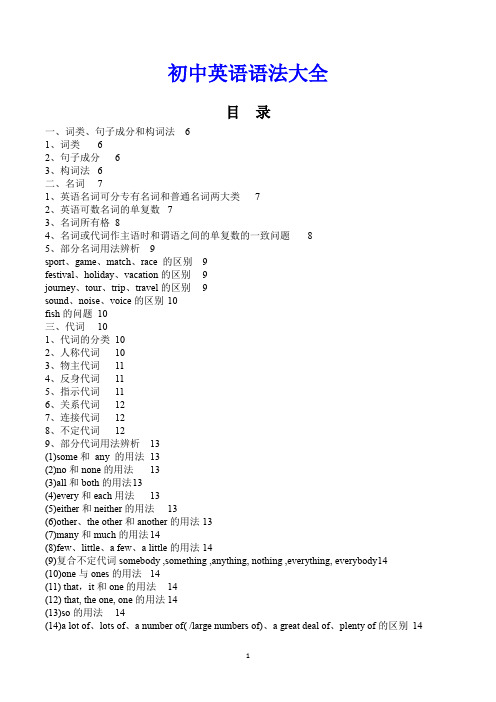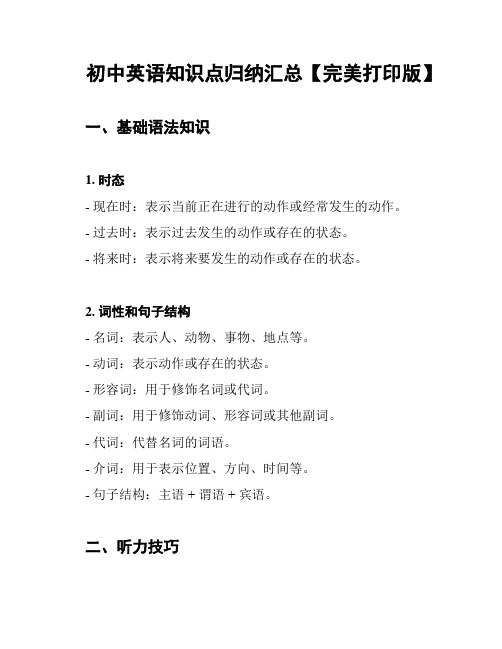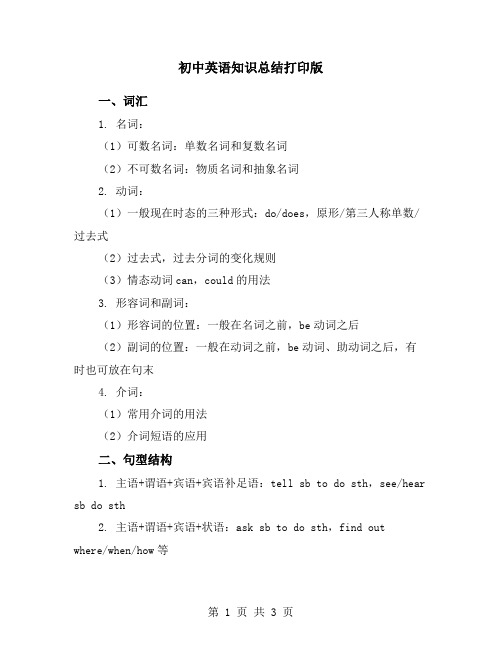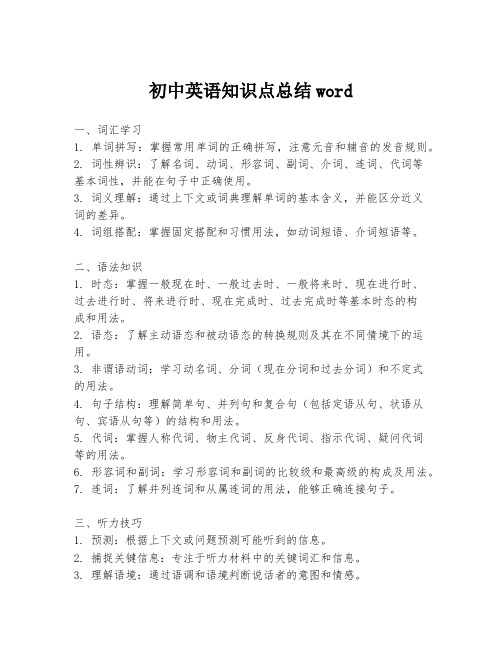初中英语知识点大全.docx
初中英语知识点总结.doc

初中英语知识点总结.doc一、词汇与语法1. 词汇积累- 常用基础词汇:掌握日常生活、学习、娱乐等相关的基础词汇。
- 词性变化:了解名词、动词、形容词、副词等词性的构成和变化规则。
- 短语搭配:学习并记忆动词短语、介词短语等固定搭配。
2. 语法结构- 时态:掌握一般现在时、一般过去时、一般将来时等基本时态的构成和用法。
- 语态:了解主动语态和被动语态的区别及转换方法。
- 句型:学习简单句、并列句和复合句的构造,包括定语从句、状语从句等。
- 非谓语动词:掌握动名词、分词(现在分词和过去分词)的用法。
二、阅读理解1. 阅读技巧- 快速阅读:培养快速浏览文章,抓住主旨大意的能力。
- 精读理解:通过细致阅读,理解文章的具体内容和深层含义。
- 推理判断:根据上下文线索,进行逻辑推理和判断。
2. 题型应对- 细节理解题:通过定位法找到相关信息,回答问题。
- 主旨大意题:抓住文章开头和结尾,理解中心思想。
- 推理判断题:依据文章内容进行合理推断。
三、写作技巧1. 文章结构- 开头:引入话题,明确主题。
- 正文:分段论述,每段一个中心句,后跟支持细节。
- 结尾:总结全文,呼应开头,明确立场。
2. 写作类型- 记叙文:描述人物、事件、经历等。
- 议论文:表达观点,提供论据,进行论证。
- 说明文:解释事物特性、原因、过程等。
3. 写作要点- 语法准确:确保句子结构正确,无语法错误。
- 词汇丰富:使用多样的词汇和表达方式。
- 逻辑清晰:文章内容条理清晰,逻辑性强。
四、听力训练1. 听力技巧- 预测内容:根据题目或问题预测对话或文章的大致内容。
- 注意捕捉:专注于听力材料中的关键信息。
- 做好笔记:在听的过程中记录重要信息。
2. 题型应对- 对话理解题:理解对话双方的主要观点和意图。
- 短文理解题:把握短文的主旨和细节信息。
- 听力填空题:根据听到的内容准确填写信息。
五、口语表达1. 发音练习- 音标学习:掌握国际音标,正确发音。
初中英语语法大全 68页 word电子版

初中英语语法大全目录一、词类、句子成分和构词法 61、词类 62、句子成分 63、构词法 6二、名词71、英语名词可分专有名词和普通名词两大类72、英语可数名词的单复数73、名词所有格84、名词或代词作主语时和谓语之间的单复数的一致问题85、部分名词用法辨析9sport、game、match、race 的区别9festival、holiday、vacation的区别9journey、tour、trip、travel的区别9sound、noise、voice的区别 10fish的问题10三、代词101、代词的分类102、人称代词103、物主代词114、反身代词115、指示代词116、关系代词127、连接代词128、不定代词129、部分代词用法辨析13(1)some和any 的用法13(2)no和none的用法13(3)all和both的用法13(4)every和each用法13(5)either和neither的用法13(6)other、the other和another的用法 13(7)many和much的用法 14(8)few、little、a few、a little的用法 14(9)复合不定代词somebody ,something ,anything, nothing ,everything, everybody14(10)one与ones的用法14(11) that,it和one的用法14(12) that, the one, one的用法 14(13)so的用法14(14)a lot of、lots of、a number of( /large numbers of)、a great deal of、plenty of的区别14(15)none、no one、nobody的区别1510、相互代词1511、疑问代词15四、数词151、分类152、基数词153、序数词164、数词的用法17五、冠词181、冠词分类及读法 182、不定冠词a / an的用法183、定冠词the的用法184、一些不用冠词的情况19六、形容词、副词191、形容词192、有关形容词的用法辨析20⑴ whole与all 20⑵ tall与high, short与low 20⑶ real与true 20⑷ interested与interesting 20⑸ such和so 20⑹ good与well 20⑺ nice与fine 20⑻ too much与much too 20⑼ quick、fast与soon 20⑽ lonely与alone 20⑾ other与else 21⑿ special与especial21⒀ gone、lost、missing 21⒁ living、alive、live、lively 21⒂ sick与ill 21⒃ the poor(穷人们) / the rich(富人们) 213、副词21副词的分类 21副词在句子中的位置以及作用22有关副词的的用法辨析23(1) as…as…词组23(2) later、after、ago、before 23(3) above、below、over、under 23(4) too、also、either、nor 23(5) enough、too、so、very、quite、very much 23(6) sometimes、sometime、some times 、some time24(7) how、what用于感叹句的用法:24(8) already、yet 24(9) hard与hardly 24(10) like...very much、like...better(=prefer)、like...best 24(11) “quite/what+a+形容词+名词”24(12) how 的几个短语24(13) much、more与most 24(14) no more、no longer、not...any more、no...any longer 24(15) 被动语态中,方式副词一般放在be与谓语动词之间24(16) too...to...与so...that (24)(17) 既是形容词也是副词的单词25(18) farther与further 25(19) rather与quite 25(20) maybe、possibly、perhaps 25(21) most、mostly 25(22) (be) worth、(be) worthy of 25(23) almost、nearly 25(24) a bit与a little 25(25) long before和before long 264、形容词、副词的原级、比较级和最高级 26七、介词281、介词的主要用法 282、介词的分类表283、介词短语的句法作用284、介词短语在句子中的位置285、重要注释29八、动词311、动词的分类:31(1) 关于实义动词31(2) 关于连系动词31(3) 关于助动词 32(4) 关于情态动词322、动词词形变化一览表333、be(“是/存在”)动词的各种时态变化334、其它谓语动词(主动语态)的时态变化一览表335、八种时态的具体用法34一般现在时 34一般过去时 34一般将来时 35现在进行时 35过去进行时 35现在完成时 35过去完成时 36过去将来时 36现在完成进行时376、被动语态377、动词的非谓语形式38(1)动词的非谓语形式38(2)动词不定式38(3)动名词40(4)分词 418、动词用法辨析41(1)“Why not+动词原形+…?”(干嘛不……?)41(2) seem(好象)的用法41(3) be afraid(害怕)的用法42(4) be sorry(抱歉)的用法 42(5) be sure (确信)的用法 42(6)make 与do的用法42(7)put on、wear、have…on、be in、try on、dress的用法 42(8)like、love与enjoy的用法42(9)study、learn的用法42(10)think、want、would like的用法43(11)look for、search…for、find、find out的用法43(12)listen to、hear的用法43(13)look、see、watch、read的用法43(14)hear、hear of、hear from、learn的用法43(15)speak、talk、say、tell的用法43(16)be able to(do)、can的用法43(17)there be、have的用法44(18)borrow、lend、keep的用法44(19)bring、take、carry、send、lift的用法44(20)hope、wish的用法44(21)take、spend、pay、cost的用法44(22)begin、start的用法44(23)arrive in/at、reach、get to的用法44(24)be made of、be made from、be made into、be made in、be made by、be made for的区别45(25)be used for、be used to、used to、get used to的区别45(26)beat,win与lose的用法45(27)grow、plant、keep的区别45(28)fall、drop的区别45(29)join、join in、take part in的区别:45(30)beat、hit、strike的用法45(31)carry on、carry out的区别45(32)be amazed与be surprised的区别 46(33)warn的用法46(34)think of、think about与think over等短语的区别46(35)agree with/ agree to / agree on等词语用法 46(36)deserve(应该,应得)的用法46九、连词46连词用法辨析46(1)because、as、since、for的用法46(2)if、whether的区别47(3)while、when、as的用法区别47(4)till/until与not…till/until的区别47(5)though与although的区别47(6)prefer to…,rather than…与prefer…to…的区别47十、简单句 481、简单句的特点482、简单句的种类483、陈述句48陈述句的肯定式48陈述句的否定式484、疑问句48一般疑问句 48特殊疑问句 49反意疑问句 50选择疑问句 505、祈使句506、感叹句50十一、句子成分:主语、谓语、宾语、表语、定语、宾语补足语和状语511、主语512、谓语513、宾语524、表语535、定语536、状语547、宾语补足语54十二、简单句的五种基本句型54十三、并列复合句551、基本概念552、常见的并列句55十四、主从复合句551、概念552、分类553、各从句在句子中的位置以及用法 56(1) 表语从句56(2) 宾语从句56(3) 状语从句56(4) 定语从句57(5) 主语从句57十五、直接引语和间接引语 581、直接引语和间接引语582、直接引语改变为间接引语:58十六、倒装句58一、词类、句子成分和构词法1、词类英语词类分十种:名词、形容词、代词、数词、冠词、动词、副词、介词、连词、感叹词。
初中英语知识点归纳汇总【完美打印版】

初中英语知识点归纳汇总【完美打印版】一、基础语法知识1. 时态- 现在时:表示当前正在进行的动作或经常发生的动作。
- 过去时:表示过去发生的动作或存在的状态。
- 将来时:表示将来要发生的动作或存在的状态。
2. 词性和句子结构- 名词:表示人、动物、事物、地点等。
- 动词:表示动作或存在的状态。
- 形容词:用于修饰名词或代词。
- 副词:用于修饰动词、形容词或其他副词。
- 代词:代替名词的词语。
- 介词:用于表示位置、方向、时间等。
- 句子结构:主语 + 谓语 + 宾语。
二、听力技巧1. 注意听题目- 在听力部分开始前,注意听清题目要求和选项内容。
2. 多练听力材料- 多听一些英语听力材料,提高对不同语速和发音的适应能力。
3. 提前预测答案- 在听力材料播放过程中,根据自己的理解和预测,提前预测下一个可能的答案。
三、阅读技巧1. 先浏览全文- 在阅读文章时,先快速浏览全文,了解大致内容和结构。
2. 标记关键信息- 标记文章中的关键信息,如主题句、关键词等。
3. 查找上下文线索- 根据上下文线索,推测单词、短语或句子的含义。
四、写作技巧1. 合理安排篇章结构- 写作时,先确定篇章结构,将内容分为引言、正文和结论。
2. 使用恰当的连接词- 使用适当的连接词,使文章更连贯、流畅。
3. 多练写作- 多进行写作训练,提高写作能力和表达思想的能力。
以上是初中英语的一些基础知识和研究技巧,希望对你的研究有所帮助。
---以上是初中英语知识点归纳汇总【完美打印版】的内容,总字数超过800字。
初中英语知识总结打印版

初中英语知识总结打印版一、词汇1. 名词:(1)可数名词:单数名词和复数名词(2)不可数名词:物质名词和抽象名词2. 动词:(1)一般现在时态的三种形式:do/does,原形/第三人称单数/过去式(2)过去式,过去分词的变化规则(3)情态动词can,could的用法3. 形容词和副词:(1)形容词的位置:一般在名词之前,be动词之后(2)副词的位置:一般在动词之前,be动词、助动词之后,有时也可放在句末4. 介词:(1)常用介词的用法(2)介词短语的应用二、句型结构1. 主语+谓语+宾语+宾语补足语:tell sb to do sth,see/hear sb do sth2. 主语+谓语+宾语+状语:ask sb to do sth,find outwhere/when/how等3. There be句型的应用:表示某地(某时)有某物,其主语不一定是人或物。
4. It is/was…句型的应用:it可用作形式主语或形式宾语,代替一个不定式、动名词或主语从句,使句子保持句式上的平衡。
句型中可以填入名词、形容词、过去分词、动词原形等。
三、时态和语态1. 一般现在时态:经常性、习惯性、客观真理。
强调动词所表示的动作或状态的特征,一般表示动作或状态的特点及动作的时间,是其他时态的基础。
其形式为:s + V(实意动词),如果实意动词是be 动词时,只将be动词换成am/is/are。
2. 现在进行时态:表示现阶段或现阶段发生的事情,常与everyday,often,last+一段时间连用。
其形式为:am/is/are + V-ing(现在分词)。
结构:①be动词一般位于句首。
②主语后跟现在分词作宾语。
③有时主语后跟的是动词的现在分词短语,在句中作定语,状语等。
④every d ay / week ,介词短语或时间状语置于句首。
④主语通常是名词或代词。
被动语态由“助动词be+及物动词的过去分词”构成。
助动词be随主语的人称和数而变化。
初中英语知识点总结word

初中英语知识点总结word一、词汇学习1. 单词拼写:掌握常用单词的正确拼写,注意元音和辅音的发音规则。
2. 词性辨识:了解名词、动词、形容词、副词、介词、连词、代词等基本词性,并能在句子中正确使用。
3. 词义理解:通过上下文或词典理解单词的基本含义,并能区分近义词的差异。
4. 词组搭配:掌握固定搭配和习惯用法,如动词短语、介词短语等。
二、语法知识1. 时态:掌握一般现在时、一般过去时、一般将来时、现在进行时、过去进行时、将来进行时、现在完成时、过去完成时等基本时态的构成和用法。
2. 语态:了解主动语态和被动语态的转换规则及其在不同情境下的运用。
3. 非谓语动词:学习动名词、分词(现在分词和过去分词)和不定式的用法。
4. 句子结构:理解简单句、并列句和复合句(包括定语从句、状语从句、宾语从句等)的结构和用法。
5. 代词:掌握人称代词、物主代词、反身代词、指示代词、疑问代词等的用法。
6. 形容词和副词:学习形容词和副词的比较级和最高级的构成及用法。
7. 连词:了解并列连词和从属连词的用法,能够正确连接句子。
三、听力技巧1. 预测:根据上下文或问题预测可能听到的信息。
2. 捕捉关键信息:专注于听力材料中的关键词汇和信息。
3. 理解语境:通过语调和语境判断说话者的意图和情感。
4. 笔记技巧:学会在听的过程中做有效笔记,记录重要信息。
四、阅读理解1. 快速阅读:培养快速浏览文章,抓住主旨大意的能力。
2. 细读理解:细致阅读,理解文章细节和深层含义。
3. 推理判断:根据文章内容进行逻辑推理,推断隐含信息。
4. 词汇猜测:通过上下文猜测生词的大致意思。
5. 题型应对:熟悉不同类型的阅读理解题目,掌握解题技巧。
五、写作技巧1. 文章结构:学习如何组织文章,包括引言、正文和结尾。
2. 句式多样性:使用不同类型的句子结构,增加文章的丰富性。
3. 逻辑连贯:确保文章内容逻辑清晰,使用恰当的连接词。
4. 语法准确:注意语法正确性,避免基本的语法错误。
(完整word)初中英语基础知识汇总,推荐文档

第一篇基础知识第一节字母英语是字母文字,共有26个字母,26个字母按一定的顺序排列在一起便组成字母表,英语中称之为“Alphabet”。
1.26个字母的读音2.元音字母是哪些?英文字母分为元音字母和辅音字母。
Aa , Ee , Ii, Oo, Uu为5个元音字母,除Yy 外其他20个为辅音字母。
Yy 为半元音字母.第二节语音关于语音的几个概念1)字母:语言的书写形式。
元音字母a, e, i(y), o, u,2)音标:词的语音形式。
3)音素:音的最小的单位。
英语中有48音素。
4)音节:由元音和辅音构成的发音单位。
ap'ple, stu'dent, tea'cher, un'der'stand5)元音:发音响亮,是乐音;口腔中气流不收阻碍;是构成音节的主要音。
英语中有20个元/כ:/ /u/ /u:/ 双音。
单元音有12个:/i:/ /I/ /e/ /æ/ /ə:/ /ə/ /∧/ /a:/ /כ/元音有8个/eI/ /aI/ /כI/ /əu/ /au/ /Iə/ /εə/ /uə/6)辅音:发音不响亮,是噪音;口腔中气流受到阻碍;不是构成音节的主要音。
英语中有28个辅音。
清辅音有11个:/p/ /t/ /k/ /f/ /s/ /θ//∫/ /h/ /t∫/ /tr/ /ts/ 浊辅音有17个:/b/ /d/ /g/ /v/ /z/ /δ/ /з/ /r/ /dз/ /dr/ /dz/ /m//n/ /ŋ / /l/ /w/ /j/7)开音节:a) 辅音+元音+辅音+e name bike ;b) 辅音+元音he, go, hi8)闭音节:a) 辅音+元音+辅音bad, bed, sit, hot, cup; b)元音+辅音it9)重读音节:单词中发音特别响亮的音节。
第二篇语法知识梳理第一节词法在英语中,共有10大词类,它们是:名词、动词、形容词、副词、数词、代词、冠词、介词、连词、感叹词。
初中英语知识点总结文档
初中英语知识点总结文档一、词汇学习1. 单词拼写:掌握常用单词的正确拼写,注意元音和辅音的发音规则。
2. 词性辨识:识别名词、动词、形容词、副词、介词、连词、代词等基本词性。
3. 词义理解:理解单词的基本含义,并能通过上下文推测生词的意思。
4. 词组搭配:学习固定搭配和短语,如动词短语、介词短语等。
二、语法知识1. 时态:- 一般现在时:表示经常发生的动作或状态。
- 一般过去时:表示过去发生的动作或状态。
- 现在进行时:表示正在进行的动作。
- 过去进行时:表示过去某个时间点正在进行的动作。
- 一般将来时:表示将来会发生的动作或状态。
- 现在完成时:表示过去发生的动作对现在的影响或结果。
2. 语态:- 主动语态:主语是动作的执行者。
- 被动语态:主语是动作的承受者。
3. 非谓语动词:- 动名词:作为名词使用,表示动作。
- 分词:现在分词和过去分词,可作形容词或副词用。
- 不定式:作为名词、形容词、副词等使用。
4. 句子结构:- 简单句:只有一个主谓结构。
- 并列句:由两个或多个简单句通过并列连词连接。
- 复合句:包含一个主句和至少一个从句。
- 从句:名词性从句、定语从句、状语从句。
5. 代词:- 人称代词:主格和宾格。
- 物主代词:形容词性物主代词和名词性物主代词。
- 反身代词、指示代词、疑问代词等。
6. 形容词和副词:- 比较级和最高级形式。
- 形容词和副词的用法。
7. 介词:表示时间、地点、方向、原因等。
三、听力技巧1. 预测:根据上下文或问题预测可能的答案。
2. 注意细节:听力材料中的关键信息往往是细节。
3. 抓住主旨:理解听力材料的主要内容和目的。
4. 培养同义替换意识:听力中常见的同义替换现象。
四、阅读理解1. 快速阅读:通过快速阅读抓住文章的大意。
2. 精读:对文章的难句和重要段落进行深入理解。
3. 推理判断:根据文章内容进行逻辑推理和判断。
4. 寻找主题句:通常在段落的开头或结尾,概括段落大意。
(完整版)初中英语知识点总结.doc
初中复料【初中英】1 (see 、hear 、notice 、find 、feel 、listen to 、 look at ( 感官 )+do eg:I like watching monkeys jump2 (比and 比)表示越来越怎么3 a piece of cake =easy 小菜一碟(容易)4 agree with sb 成某人5 all kinds of 各种各 a kind of 一6 all over the world = the whole world 整个世界7 along with 同⋯⋯一道,伴随⋯⋯ eg : I will go along with you 我将和你一起去the students planted trees along with their teachers 学生同老一起种8 As soon as 一怎么就怎么9 as you can see 你是知道的10 ask for ⋯⋯求助向⋯要⋯(直接接想要的西)11 ask sb for sth 向某人什么12 ask sb to do sth 某人某事ask sb not to do 叫某人不要做某事13 at the age of 在⋯⋯14 at the beginning of ⋯⋯⋯⋯的起初;⋯⋯ 的开始15 at the end of + 地点 /+ 最后;尽;末尾16 at this time of year 在每年的个候17 be /feel confident of sth /that clause + 从句感 /什么有信心,自信18 be + doing 表: 1 在行 2 将来19 be able to (+ v 原 ) = can (+ v 原)能⋯⋯21 be afraid to do (of sth 恐惧,害怕⋯⋯22 be allowed to do 被允做什么23 be angry with sb 生某人的气24 be angry with(at) sb for doing sth 什么而生某人的气25 be as ⋯原⋯ as 和什么一eg : She is as tall as me 她和我一高26 be ashamed to27 be away from 离28 be away from 从⋯⋯离开29 be bad for 什么有害30 be born 出生于31 be busy doing sth 忙于做什么事be busy with sth 忙于⋯⋯32 be careful 当心;小心33 be different from ⋯⋯和什么不一34 be famous for 以⋯⋯著名35 be friendly to sb 某人友好36 be from = come from 来自37 be full of 装⋯⋯的be filled with 充 eg: the glass is full of water the glass is filled with water38 be glad+to+do/ 从句39 be going to + v( 原)将来40 be good at(+doing) = do well in 在某方面善 , 善于⋯⋯41 be good for 什么有好42 be happy to do 很高做某事43 be helpful to sb 某人有好44 be in good health 身体健康45 be in trouble 于困中46 be interested in 某方面感趣47 be late for = come late to 到eg: Be late for class 上到48 be like 像⋯⋯eg : I'm like my mother49 be mad at 生某人的气50 be made from 由⋯⋯制成 ( 制成以后看不原材料)51 be made of由⋯⋯制成(制成以后看得原材料)52 be not sure 表不确定53 be on a visit to 参54 be popular with sb 受某人迎55 be quiet 安静56 be short for 表 **的写eg: 陶 is short for 陶俊杰57 be sick in bed 生病在床58 be sorry to do sth be sorry for sb eg : I am sorry for you59 be sorry to hear that60 be sorry to trouble sb61 be strict in doing sth 于做某事62 be strict with sb 某人要求格63 be strict with sb in sth 某方面某人格64 be supposed to do 被要求干什么65 be sure 表确定66 be sure of doing sth 做某事有信心67 be sure of sth 做某事有信心68 be sure that sth 做某事有信心69 be sure to do sth 一定会做某事We are sure to learn English well 我一定能学好英70 be terrified of + 名 / doing 害怕⋯⋯71 be terrified to do sth 害怕做某事72 be the sa me as ⋯和什么一73 be used to doing sth 做某事 My father is used to getting up early 我爸爸早74 be worth doing 得做什么75 be(feel) afraid to do sth 害怕做某事 be afraid of sth 害怕某物be afraid that 句76 because+ 句子because of + 短eg : He was late because he had a headache He was late because of his headache77 begin to do = start to do 开始做某事start ⋯ with ⋯ =begin ⋯ with ⋯以什么开始什么78 between ⋯ and⋯两者之79 borrow sth from sb 向⋯⋯借⋯⋯lend sth to sb ( lend sb sth 借⋯⋯什么西80 both = the same(as) = not different(from) 表相同81 bother 打bother sb to do stheg : I'm sorry to bother you ,but can you tell me to way to the station我十分道歉打你,但是你能告我怎么去站82 by the end of 到⋯⋯止83 call sb sth eg : We call him old wang85 catch up with sb 赶上某人86 chat with sb 和某人take sb to + 地点某人去某地87 come in88 come over to 来89 come up with 提出eg: Can you come up with a good idea 你能想出一个好法?90 communicate with sb 和某人交流91 consider + doing 考做什么eg : Why not consider going to lu zhou 什么不考去州?92 dance to 随着⋯⋯跳舞93 decide to do sth 决定做某事94 do a survey of 做某方面的95 do better in 在⋯⋯方面做得更好96 do wrong 做97 Don't forget to do sth 不要忘了做某事98 Don't mind +doing / 从句 /名不要介意⋯⋯99 each + 名()每一个⋯ eg : Each student has many books 每一个学生都有一些100 end up +doing101 enjoy +doing 喜102 escape from 从⋯⋯逃跑103 expect to do sth 期待做某事104 fall down 摔下来fall off 从哪摔下来105 fall in love with sb /sth 上什么106 far from 离某地107 find +it +adj +to do 做某事怎么108 find sb/sth +adj 什么怎么 eg : I find the book interesting109 finish 完成 +doing (名)110 fit to sb = be fit for sb 适合某人111 forget to do 没有做而忘了forget doing 做了而又忘了112 from ⋯ to ⋯从某某到某某eg: From me for her113 get /have sth down 做完,被(人)做⋯ eg: I have my hair cut 我理了 ( 被剪了)Tom got his bad tooth pulled out母把他的坏牙拔掉了(被牙医拔掉了)114 get a part-time job= find a part-time job115 get along well with sb = get on well with sb 与某人相得好116 get along with sb = get on with sb 与某人相117 get ready for = be ready for 什么而准118 get sb in to trouble 某人来麻120 get ⋯ from ⋯从某得到某物121 give a talk 做告122 give sth to sb give sb sth 某人某物123 go fish go swimming 游泳124 go on to do 去做下一件事go on doing 做件事125 go out away from 离go out of 从⋯ .离开126 go to school 上学(用于的)go to the school 去学校(不一定是上学)127 good way to 好方法128 hate to do 没做的事hate doing 做的事129 have a party for sb 的晚会130 have a talk 听告一131 have been doing 在完成行132 have been to ⋯ ( 地方)⋯⋯去某地方have gone to ⋯(地方)去了某地没回来133 have fun +doing 玩得高134 have sth to do 有什么事要做135 have to do sth 必做某事136 have trouble (problem) (in) doing sth 做什么事情有麻137 have ⋯ time +doing138 have ⋯( ) ⋯ off放⋯⋯假139 hear sb +do/doing 听某人做某事 /正在做某事140 help a lot 很大用141 help sb with sth \one's sth 帮助某人某事(某方面)help sb (to) do sth 帮助某人做某事142 hope to do sth 希望做某事143 How about(+doing) = What about(+doing)144 how do you like = what do you think of 你什么的看法145 if : 是否= wethereg: I don't know if (wether) I should go to the party 我不知道我是否去参加晚会He don't know if (wether) we will arrive on time tomorrow morning 他不知道我明天早上是否能准到达146 if : 如果,假如(全部接一般)+条件从句eg: I'll go to LuZhou if it does't rain 假如明天不下雨,我就去州If they change the plan they will let me know 假如他要改划,他会我知道的I'll go to England ,if I have enough money next year 如果我明年由足的,我就要去英国147 in one's opinion = sb think 某人148 in some ways 在某些方面149 in the end = finally(adv) 最后150 in the north of ⋯什么在什么的北方( north 北sowth 南west 西east )151 in the sun 在太阳下152 increase增加eg : They've increased the prece of petrol by 3% 他把石油价增加了3% 153 instead of +(名)代替eg:I'd like an apple instead of a pear 我想要苹果,而不要梨子154 introduce sb to sb 介某人某人introduce oneself 自我介155 invite sb to do sth 邀某人做某事156 It takes sb sometime to do sth 做某人花掉某人多少eg : It took me 5 minutes to do my homework It takes me half an hour to cook 157 It's +adj +for sb to do sth 某人来做某事怎么158 It's +adj +to do 做某事怎么159 It's +adj for sb 于某人来怎么It's +adj of sb 某人来太怎么160 It's +adj(for sb) to do (某人来)做某事怎么It's +adj of sb to do sth 某人来做某事太怎么eg : It's nice of you to help me with my English161 It's a good idea for sb to do sth ⋯⋯来是个好主意162 It's important to sb 某人来很重要eg: It's important to me163 It's time to do sth It's time for sth 到了去做某事的eg : It's time to have class It's time for class 去上了164 join = take part in 参加165 just now 才166 keep +sb /sth +adj / 介短什么保持什么?167 keep out 不⋯⋯入168 keep sb adj ⋯⋯保持⋯⋯keep healthy保持健康169 key to + 名表示:某物的匙或某的答案170 key to ⋯anserto ⋯key 可以是答或匙171 laugh at ⋯取笑⋯⋯172 learn by oneslfe 自学173 learn from sb 向某人学174 learn to do sth 学做某事175 let sb do sth 某人做某事176 Let sb down 某人失望eg : We shouldn't let our farents down 我不我的父母失望177 live from : 离某地178 live in + 大地方 /at + 小地方居住在某地179 look after = take care of 照照看180 lose one's way 迷路181 make a decision to do sth 决定做某事182 make friends with sb 和成朋友eg :I want to make friends with you183 make it early 把定的早一点184 make on exhibition of oneself 某人出洋相185 make sb /n +n 使什么成什么eg : I made her my step moller I made you my wife186 make sb /sth +adj 使某人(某物)怎么eg :You must made your bed clean 187 make sb /sth adj 使某人 /某物怎么188 make sb do sth 某人做某事189 make up be made up of ( 被)由⋯⋯成190 make ⋯ difference to ⋯191 mind sb to do mind one's doing 介意⋯⋯做什么192 most + 名most of + 代193 much too + 形容194 must be 一定195 need + 名196 need sb do sth 需要某人做某事197 need to do ( )need do ( 情)198 no /neithr of hate to do no /neithr of hate doing199 no + 名200 not anymore = no more 再也不⋯⋯eg: He didn't cry any mor e201 not ⋯ (形、副) at all eg: He's not tall at all she doesn't junp far at all 202 not ⋯ at all 一点都不203 not ⋯ either 表否定,也不eg : I don't japanse either I don't have sister, either 我也没有姐姐204 not ⋯ until 直到⋯⋯才⋯⋯205 offer / provide sb with sth 某人提供206 offer sb sth ( offer sth to sb 提供什么西某人eg : I offer you water (I offerwater to you 我你提供水207 on one's way to ⋯在去那的路上208 on the one hand 一方面on the other hand 另一方面209 on the phone = over the phone 用交210 on time 准in time 及211 one day = some day = someday 一天,有一天212 one of + 可数名的复数形式213 one to another 一个到另一个214 over and over agin 一遍又一遍的eg : He cleaned the floor over and over agin215 part-time job 兼工作fall-time job 全工作216 pay for ⋯付⋯⋯pay the bill 开,付217 please +do218 please help yourself219 pleased with sb220 pool into = pore into221 practice +doing 做某事222 prefer sth to sth 相⋯⋯更喜⋯⋯eg : I prefer physics to chemisty 在物理和化学中,我更喜物理prefer sb not to do sth 更愿意⋯eg: I prefer her not to come 我不喜她不来223 pretend to do sth 装着去做什么pretend that 从句eg : The two cheats pretended to be working very hard 两个子装着努力工作224 rather ⋯ than 宁可⋯⋯也不⋯⋯eg : I would rather be a doctor than a teacher 我愿肯当医生,也不当老225 regard ⋯ as 把⋯⋯当作⋯⋯I regard you as my friend 我把你当作我的朋友226 remid sb about sth 提醒某人什么事remid sb to do sth 提醒某人做某事eg : he remids me about cooking (he remids me to cook 他提醒我做227 remid sb of sth 使某人想起什么the words that (which) the teacher talke to remind me of my mother228 return sth to sb 什么西某人229 say to oneself 自己230 say to sb 某人231 sb spend somemoney on sth 花了多少在某事上232 sb spend sometime with sb 花了多少陪233 sb spend sometime(in) doing sth 花了多少做某事234 sb with sb +is sb and sb +are235 see sb do 看某人做某事see sb doing 看某人正在做某事236 seem to do/be +adj 得怎么eg :You seem to be tired You seem to be happy237 send +sb sth 送某人某物238 send ⋯ to ⋯把什么寄到哪里去?239 shock 使⋯⋯震惊eg : Oh , It's only you ! You give me a shock 啊,是你呀!吓我一跳240 show sb sth 向某人展示某物241 show sb sth = show sth to sb 拿什么西某人看242 show sth to sb 向某人展示某物243 some ⋯ others ⋯一些⋯⋯另一些⋯⋯244 start ⋯ with ⋯从⋯⋯开始begin ⋯ with ⋯从⋯⋯开始245 stay away from 离⋯⋯eg : We're told to stay away from the animals whe visiting the zoo 当我参 zoo ,我要离物246 stop doing 停下正在做的事247 stop sb from doing sth 阻止某人做某事248 stop sb(from) doing 阻止某人做某事249 stop to do 停下正在做的事去做下一件事250 such + 名,种251 suit sb 适合某人252 surprise sb 使某人惊奇to one's surprise 令某人惊奇253 take classes 上254 take sb to 把某人去eg : I take you to the hospital255 take walks = take a walk = go for a walk 散步256 ① talk to ② talk with 和③ talk of 到④ talk about 关于⋯⋯257 talk with sb 和某人258 teach sb sth 教某人做某事259 tell sb do sth 告某人做某事261 tell sb sth 告某人某事tell sb that 句tell sb not to do sth262 tell sb 〔 not 〕to do sth 告某人做什么263 tell ⋯ from ⋯区别264 thank you for +doing265 the same + 名 (doing)+as ⋯⋯266 the same ⋯(名 ) ⋯ as as⋯ (adj adv) ⋯ as 相同267 the way to do sth = the way of doing st 做某方面的方法the way to + 地方去哪的路e g :Do you know the way to learn English Do you know the way of learning English268 the way to ⋯(地点)到哪的270 transalte ⋯⋯ into ⋯⋯把什么翻成什么eg : Trasalte English into chinese271 travel with sb 和某人去旅游272 try one's best to do sth 尽某人最大的努力去做某事eg: I will try my best to learnEnglish well273 try to do sth 想干什么,但没成功try doing sth 想干什么,已做了274 try ⋯衣服 have a try 一下275 turn down 开小←→ turn up 开大276 turn off 关上←→turn on 打开 open 拆开277 upside down 倒着278 visit to ⋯参某个地方279 wait for sb 等某人【比 since 和 for 】Since 用来明作起始,for 用来明作延度。
(超详)初中英语知识点归纳汇总
初中英语知识归纳总结(打印版)第一课时名词一、概述1、名词的属性:表示人或事物的名称抽象概念的词叫名词。
2、名词分普通名词和专闻名词。
普通名词是表示某一类人或事物,或某种物体或抽象概念的名称。
如:teacher, desks, plates, milk, box等,专闻名词表示某一特定的人、事物、地方团体、党派、国家机关、语言、节日等专用的名称。
(运用)如:China, Chinese, Saturday, June, Green, Beijing, Olympic等。
(专闻名词的第一个字母要大写)二、可数名词与不可数名词1、可数名词是指表示人或事物,可以用数来计量的名词,有单复数之分。
如:glass-----glasses; book---- books2、不可数名词是指所表示的事物不能用数来计量。
如:paper, rice, water , milk, tea等。
3、有些名词在特定情况下由不可数变为可数名词。
Light travels faster than sound; (light:光芒,不可数)The lights are on. (light:灯,可数)4、不可数名词的量的表示不可数名词普通无法用数来计算,前面不能用a或an或数词来表示数量,它的量往往借助于容器来表示。
如:a glass of milk ------ four glasses of milka piece of paper ------ two pieces of papera bag of rice ------ three bags of rice三、可数名词的复数形式(识记、运用)1、可数名词在应用时有单复数之分,单数变复数有规矩变化和不规矩变化两种。
规矩变化2、少数名词有不规矩的变化形式policeman---policemen; man---men; woman---women;tooth---teeth; foot---feet; sheep---sheep; deer---deer;Japanese--- Japanese; Chinese --- Chinese; fish --- fish四、名词所有格(运用)名词的所有格是表示所有关系的形式,它也有构成上的变化。
初中英语全部知识点总结(打印版)(DOC)
初一年级(上)【知识梳理】I. 重点短语1. Sit down2. on duty3. in English4. have a seat5. at home6. look like7. look at8. have a look9. come on10. at work11. at school12. put on13. look after14. get up15. go shoppingII. 重要句型1. help sb. do sth.2. What abo ut…?3. Let‟s do sth.4. It‟s time to do sth.5. It‟s time for …6. What‟s…? It is…/ It‟s…7. Where is…? It‟s….8. How old are you? I‟m….9. What class are you in? I‟m in….10. Welcome to….11. What‟s …plus…? It‟s….12. I think…13. Who‟s this? This is….14. What can you see?I can see….15. There is (are) ….16. What colour is it (are they)? It‟s (They‟re)…17. Whose …is this? It‟s….18. What time is it? It‟s….III. 交际用语1. Good morning, Miss/Mr….2. Hello! Hi!3. Nice to meet you. Nice to meet you, too.4. How are you? I‟m fine, thank you/thanks. And you?5. See you. See you later.6. Thank you! You‟re welcome.7. Goodbye! Bye!重要语法动词be的用法;人称代词和物主代词的用法;名词的单复数和所有格的用法;冠词的基本用法;句型的用法。
- 1、下载文档前请自行甄别文档内容的完整性,平台不提供额外的编辑、内容补充、找答案等附加服务。
- 2、"仅部分预览"的文档,不可在线预览部分如存在完整性等问题,可反馈申请退款(可完整预览的文档不适用该条件!)。
- 3、如文档侵犯您的权益,请联系客服反馈,我们会尽快为您处理(人工客服工作时间:9:00-18:30)。
初中英语知识点总结大全英语知识点是英语学习中一个重要的组成部分 , 下面是我为大家带来的初中英语知识点总结,相信对你会有帮助的。
初中英语知识点总结:被动语态初中英语学习最难的是语法,因为英语的语法跟汉语的语法有很大的不同。
其中被动语态是初中英语学习的重点和难点。
下面为大家讲解一下初中英语被动语态特点和用法。
一、被动语态的构成形式1.被动语态的基本时态变化被动语态通常为十种时态的被动形式 , 被动语态由be+过去分词构成, be 随时态的变化而变化。
以 do 为例,各种时态的被动语态形式为:1)am/is/are +done ( 过去分词 ) 一般现在时例Visitors are requested not to touch theexhibits.2) has /have been done现在完成时例 All the preparations for the task have beencompleted, and we're ready to start.3) am/is /are being done现在进行时例 A new cinema is being built here.4) was/were done一般过去时例 I was given ten minutes to decide whether I should reject the offer.5) had been done过去完成时例 By the end of last year, another new gymnasium had been completed in Beijing.6) was/were being done过去进行时例 A meeting was being held when I was there.7) shall/will be done一般将来时例 Hundreds of jobs will be lost if thefactory closes.8) should/would be done过去将来时例 The news would be sent to the soldier'smother as soon as it arrived.9) shall/will have been done将来完成时(少用)例 The project will have been completed beforeJuly.2.被动语态的特殊结构形式1) 带情态动词的被动结构。
其形式为:情态动词+be+过去分词。
例 The baby should be taken good care of bythe baby-sitter.2)有些动词可以有两个宾语,在用于被动结构时,可以把主动结构中的一个宾语变为主语,另一宾语仍然保留在谓语后面。
通常变为主语的是间接宾语。
例 His mother gave him a present for hisbirthday. 可改为 He was given a present by his mother forhis birthday.3)当“动词 +宾语 +宾语补足语”结构变为被动语态时,将宾语变为被动结构中的主语,其余不动。
例 Someone caught the boy smoking a cigarette.可改为 The boy was caught smoking a cigarette.以及感官动词等后面不定式作宾语 补语时,在主动结构中不定式 to 要省略,但变为被动结构时,要加 to 。
例 Someone saw a stranger walk into thebuilding. 可改为 A stranger was seen to walk into thebuilding.5) 有些相当于及物动词的动词词组,如“动词 +介词”,“动词 +副词”等,也可以用于被动结构,但要把它们看作一个整体,不能分开。
其中的介词或副词也不能省略。
例 The meeting is to be put off till Friday.3. 非谓语动词的被动语态 v.+ing 态和完成时态 )形式及不定式。
to do也有被动语态( 一般时二、 如何使用被动语态学习被动语态时,不仅要知道被动语态的各种语法结构,还要知道在哪些情况中使用被动语态。
4) 在使役动词 have, make, get watch, notice, hear, feel, observe1.者不知道作的行者或不必出作的行者 ( 可省 by 短 ) 。
例 My bike was stolen last night.2.借助被的作突出作的行者。
例 I was given ten minutes to decide whether Ishould accept the offer.3.了更好地安排句子。
例 The well-known person got on the bus andwas immediately recognized by people. (一个主就了)三、 It is said that+从句及其他似句型一些表示“据”或“相信”的如believe, consider, expect, report, say, suppose, think等可以用于句型“ It +be+去分 +that 从句”或“主 +be+去分 +to do sth. ”。
有:It is said that⋯据,It is reported that道, It is believed that⋯大家相信,It is hoped that ⋯大家希望, It is well known that⋯众所周知,⋯据It isthought that⋯大家,It is suggested that⋯据建。
例 It is said that the boy has passed thenational exam. (=The boy is said to have passedthe national exam. )四、谓语动词的主动形式表示被动意义1. 英语中有很多动词如break , catch , clean ,drive ,lock , open, sell , read ,write , wash 等,当它们被用作不及物动词来描述主语特征时,常用其主动形式表达被动意义 , 主语通常是物。
例 This kind of cloth washes well.注意:主动语态表被动强调的是主语的特征,而被动语态则强调外界作用造成的影响。
试比较: The door won't lock. (指门本身有毛病)The door won't be locked. (指不会有人来锁门,指“门没有锁”是人的原因)2.表示“发生、进行”的不及物动词和短语,如:happen, last, take place, break out, come out, comeabout, come true, run out, give out, turn out等以主动形式表示被动意义。
例 How do the newspapers come out?这些报纸是如何引出来的呢?3.系动词没有被动形式 , 但有些表示感受、感官的连系动词 feel, sound, taste, book, feel等在主系表结构中常以主动形式表示被动意义。
例 Your reason sounds reasonable五、非谓语动词的主动形式表被动意义在某些句型中可用动名词和不定式的主动形式表被动意义。
1.在need,want,require, bear等词的后面,动名词用主动形式表示被动意义,其含义相当于动词不定式的被动形式。
例 The house needs repairing(to be repaired).这房子需要修理。
2.形容词 worth 后面跟动名词的主动形式表示被动含义,但不能跟动词不定式 ; 而 worthy 后面跟动词不定式的被动形式。
例 The picture-book is well worthreading.(=The picture-book is very worthy to be read.)3.不定式在名后面作定,不定式和名之有关系,又和句中另一名或代构成主关系 , 不定式的主形式表示被含。
例 I have a lot of things to do this afternoon.(to do与things是关系,与I 是主关系。
)比: I ’ll go to the post office. Do youhave a letter to be posted? (此用不定式的被作定表明 you 不是 post 作的行者。
)4.在某些“形容 +不定式”做表或足的构中,句子的主或又是不定式的,常用不定式的主形式表达被意。
些形容有nice ,easy , fit , hard , difficult , important ,impossible , pleasant ,interesting 等。
例 This problem is difficult to work out .(可看作 to work out省略了for me).5.在 too ⋯ to ⋯构中,不定式前面可加主,所以用主形式表示被意。
例 This book is too expensive (for me) to buy.6.在there be⋯句型中,当不定式修名作定,不定式用主式作定,重点在人,用被形式作定,重点在物。
lose例可看成There is no time to lose(to be lost).(for us to lose;用to be lost,用lost timeto不明确。
)7.在 be to do 构中的一些不定式通常用主表主 , 被表被。
然而 , 由于古英的影响 , 下列rent,blame,let等仍用不定式的主形式表示被意。
例 Who is to blame for starting the fire?初中英知点:句型构初中英法中,有很多特殊句型构,牢些句型构,以后再运用上就可以得心手。
下面是初中英重点句型构,希望能帮助到大家。
look at ( jump.1 、 see, hear ,notice ,find , feel , listen to感官 )+ do eg: I like watching monkeys,2 ( 比 and比)表示越来越⋯⋯3 a piece of cake =easyplace of interest名小菜一碟(容易):a4 agree with sb.成某人5 all kinds of各种各 a kind of一种/6 all over the world = the whole world整个世界7 along with同⋯⋯一道,伴随⋯⋯eg : I willgo along with you我将和你一起去The students plantedtrees along with their teachers.学生同老一起种。
